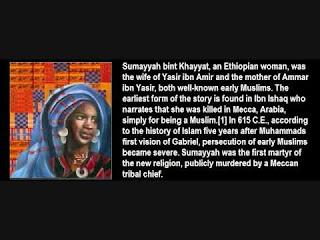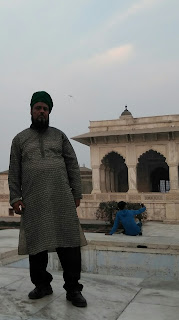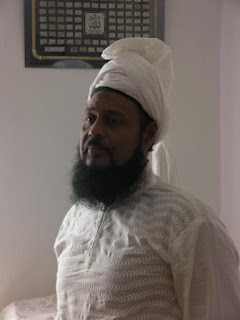In his special address on the occasion of the Annual Conference of the Siraj Makin (sisters of the Jamaat Ul Sahih Al Islam International) at Mauritius on 14th August 2016, the Khalifatullah Hadhrat Munir Ahmad Azim Saheb (atba) spoke profoundly on the critical role of women in the Muslim family and social order. In the speech, Hadhrat Saheb (atba) draws our attention to the exceptional legacy of the inspirational, pious women ancestors of the Muslims at a time the world is virtually bereft of true spiritual role models to look up to and draw energy for engaging with the complex contingencies of our everyday life.
Many of the women companions and disciples of the Holy Prophet (sa) were blessed with rare common sense and sense of perception, sound judgement and deep understanding, profound faith and courage of conviction. All these qualities helped them to take daring positions at the dawn of Islam's encounter with a decadent Meccan society. History chronicles that the wise opinions and bits of advice rendered by Ummul Mu'mineen Hadhrat Khadija (ra) has had great impact on her husband, the Holy Prophet (sa) at the most critical of the times of his Divine Mission so much so that the Prophet (sa) used to remember and miss her inspirational presence in his life, long after she was dead. On the other hand, Hadhrat Sumayya (ra) became one of the first martyrs of Islam: bearing witness with her life to the deep conviction she has had in the enduring promise of Islam as the path to follow at all costs.

On an everyday basis, it is a law of life that duties and rewards are attached to each one of us in our individual, family and social relations and the best outcomes depend upon the respective performance of the persons involved. Whether involved in the proper management of household affairs, or multi-tasking in a professional capacity, women today have manifold responsibilities. Success comes to those who are able to maintain and retain the fine balance over these diverging tasks and challenges, both in and out of the home. Hadhrat Saheb (atba) reminds all believers, including women, that it is through the proper discharge of one's duties and responsibilities at one's own level that each one of us can work for the larger goal of creating the conditions for the flourishing of true spirituality within us.
Read the Full Text of the Speech Below:
 The mother of believers, Hadhrat Ummul Mumineen Khadija (ra) was a very perceptive woman. She knew perfectly the character of men. She knew how to recognise a precious metal and did not let herself be deceived by a ‘false painting’! Perhaps her work in commerce has formed in her that capacity, for, the traders are among the best connoisseurs of human psychology!
The mother of believers, Hadhrat Ummul Mumineen Khadija (ra) was a very perceptive woman. She knew perfectly the character of men. She knew how to recognise a precious metal and did not let herself be deceived by a ‘false painting’! Perhaps her work in commerce has formed in her that capacity, for, the traders are among the best connoisseurs of human psychology!
During her business dealings, she met Muhammad (pbuh) and asked him in marriage. Muhammad was not unknown to the Arabs. The nobility of his conduct was unanimously acknowledged and this won him much admiration. And it often happens that the nobility of the heart just like the brightness of the face is a basis for general assessment and is a thing which is approved by one and all.
But after her marriage, Khadija (ra) got a better knowledge (and understanding) of her husband and realised the level of perfection he had achieved! So when he told her what had happened to him in the cave of Hira, she foretold him what shall happen (in the future) based on his own past.
She swore that a man like him cannot go astray and it was impossible that God forsakes a man to whom He has granted such nobility and honour. She said, “By Allah, Allah will never disgrace you, for, by Allah, you keep good relations with your Kith and kin, speak the truth, help the poor and the destitute, entertain your guests generously and assist those who are stricken with calamities. You restore deposits. Verily, Allah will not disgrace such a man neither in this world nor in the hereafter! Such a man is immune to the attacks of the devil.”
Khadija (ra) formed part of the high society of Quraysh, that is to say, the summit/ elite of Arab society. She was also the first woman to believe in his mission. But Islam is a universal religion destined for all social categories. If the hearts of the rich find therein an attraction, then the disadvantaged masses embrace it and expect much happiness from it. Masters and slaves occupy the same place. Thus Abu Bakr, the wealthy man embraced this religion like Bilal the freed slave.
 Certainly, Islam as a beautiful demonstration of gender equality has given their honourable place to the entire human race, regardless of their social status. Islam gives to man his true position in society and in the eyes of God. Therefore, there is no caste in Islam but rather a general brotherhood prevails. The slave and master both become the master of their destiny and share the same table and the same interests.
Certainly, Islam as a beautiful demonstration of gender equality has given their honourable place to the entire human race, regardless of their social status. Islam gives to man his true position in society and in the eyes of God. Therefore, there is no caste in Islam but rather a general brotherhood prevails. The slave and master both become the master of their destiny and share the same table and the same interests.
 If Khadija (ra) was the first believer and was part of the elites of Quraysh, certainly the first woman who received the honour of martyrdom (to die for the cause of God) was Sumayya, the mother of Ammar, who came from a poor and oppressed house, (one which is considered) without much value.
If Khadija (ra) was the first believer and was part of the elites of Quraysh, certainly the first woman who received the honour of martyrdom (to die for the cause of God) was Sumayya, the mother of Ammar, who came from a poor and oppressed house, (one which is considered) without much value.
The trials that God makes His servants undergo are varied. He tries some with fame and anonymity, some others with fortune and poverty, health and disease, and what counts is, the end.
It has been narrated that Uthman (ra), who was a man of influence among the Quraysh, said: “While I was walking in the desert with the Messenger of Allah (pbuh), we saw Ammar, his father and mother undergoing torture under the burning sun so that they may abandon Islam! Ammar’s father said to the Prophet (pbuh): “O Messenger of Allah, is this for eternity? (That is to say, will torture last for all eternity?) He replied, “Patience, O family of Yasir! May Allah forgive the (family of) Yasir, and You have indeed already been forgiven!”
Then the leaders of Jaahiliyah (of the time of Ignorance who refused Islam) came to enjoy the public spectacle of torture. Among them was Abu Jahl who was angry at the sight of the woman’s courage and endurance in the face of such trial. He thus thrust a deadly spear low, in the area of her womb. She thus became the first martyr who fell for the sake of Islam. Then divine punishment was delayed for a long time until the day of the battle of Badr. That detestable Pharaoh (i.e., Abu Jahl) then went out to fight the believers and that’s when fate sent to him two Muslim teenagers who fought him until they triumphed over him and killed him!
Certainly, Allah says in the Quran: “Indeed, We have sent to you a Messenger as a witness upon you just as We sent to Pharaoh a messenger. But Pharaoh disobeyed the messenger, so We seized him with a ruinous seizure.” (Al-Muzzammil 73: 16-17).
May Allah welcome in His love these two precious Muslim women who, before the advent of Islam came from different social statuses but with the growing strength of Islam, they became both, two sisters of hearts who sacrificed their all for the triumph of truth in the whole of Arabia, and the world until our time and for all times to come until the Final Day. Ameen.
A Woman's World: Duties and Rewards
 The woman in her home is like a jewel that is well preserved in its case. She is the inspiration of her home, its manager and the one who highlights the value of life as a couple by cooperating with her husband to ensure the happiness of the family and the safety of the property/ wealth in her possession. I welcome therefore all housewives and women who for an important reason must go out to work and contribute to solving the financial problems of their homes. These women do not leave their homes as such, but they also perform their duties both in the home and in their professional fields.
The woman in her home is like a jewel that is well preserved in its case. She is the inspiration of her home, its manager and the one who highlights the value of life as a couple by cooperating with her husband to ensure the happiness of the family and the safety of the property/ wealth in her possession. I welcome therefore all housewives and women who for an important reason must go out to work and contribute to solving the financial problems of their homes. These women do not leave their homes as such, but they also perform their duties both in the home and in their professional fields.
I bring before you today, ladies, an example of women among our pious predecessors who undertook to serve their home by doing all the work they could do for their husbands and children. This is part of the good ethics of life as a couple. This strengthens family life and allows it to perdure.
Asma, daughter of Abu Bakr As-Siddiq (the Truthful) (ra) says:
“When Az-Zubayr married me, he had neither wealth, nor slave nor anything else like it, except a camel and a horse. I used to graze his horse, provide fodder for it and look after it, and ground dates for his camel. Besides this, I grazed the camel, made arrangements for providing it with water and patched up his leather bucket and kneaded the flour.
But I was not proficient in baking the bread, so my female neighbours of the Ansars used to bake bread for me and they were sincere women. And I used to carry on my head seeds (of dates) from Az-Zubayr’s land which the Messenger of Allah had endowed him, and it was at a distance of two miles (from Madina).
As I was one-day carrying seeds upon my head I happened to meet the Messenger of Allah along with a group of his Companions. He called me and said to the camel to sit down so that he should make me ride behind him. I felt shy to go with men and I remembered Az-Zubayr and his sense of shame and jealousy.
(And afterwards when Asma related this incident to her husband) Az-Zubayr replied: ‘By Allah, the carrying of such a burden (of date stones) upon your head is more severe a burden on me than riding with him.’ And I led this life of hardship until Abu Bakr sent afterwards a female servant who took upon herself the responsibility of looking after the horse and I felt as if she had emancipated me.’” (Bukhari & Muslim).
Do you see how Asma bint Abu Bakr As-Siddiq (ra) has behaved? She did goodness and was rewarded with goodness. So be good by working for your home as much as you can, and you will find with Allah a great reward for it.
Home Affairs: Shared Responsibilities for Couples
 The housewife takes care of her home. She is the equal of her husband who leaves for work outside in order to meet the family’s needs. While her husband works outside the home to feed the household, the woman is the silent strength and example of patience in order to tackle the enormous task of caring for her household.
The housewife takes care of her home. She is the equal of her husband who leaves for work outside in order to meet the family’s needs. While her husband works outside the home to feed the household, the woman is the silent strength and example of patience in order to tackle the enormous task of caring for her household.
Couples who both need to go out of the house to work, for their part have a double share of responsibilities regarding their working lives, their homes, their children and themselves. They have the dual task of managing their home and their professional occupations.
Household tasks are not reserved exclusively for ladies. The whole household must contribute to the development of their daily lives by participating in the many tasks that the home demands from a family.
 Our beloved prophet Muhammad (pbuh) was the example of the perfect husband and he was a perfect contributor to the happiness of his home because he had more than one wife. He helped his wives with the housework, advised them in good and lived in harmony with them. He always advised them, as well as his daughters and other believers to take good care of their homes, as this is certainly a Jihad (holy effort/ holy war) for them and their reward will certainly be huge with Allah if they conform to obedience to their husband and help in proper functioning of their homes.
Our beloved prophet Muhammad (pbuh) was the example of the perfect husband and he was a perfect contributor to the happiness of his home because he had more than one wife. He helped his wives with the housework, advised them in good and lived in harmony with them. He always advised them, as well as his daughters and other believers to take good care of their homes, as this is certainly a Jihad (holy effort/ holy war) for them and their reward will certainly be huge with Allah if they conform to obedience to their husband and help in proper functioning of their homes.
May Allah help you and the Muslim women around the world to become benevolent guardians for your homes and may He inspire the desire in you to serve His cause by being faithful to your duties as a Muslim woman and to contribute to the flourishing of Islam, the focus/ home of the true servants of Allah. Insha-Allah, Ameen.



































